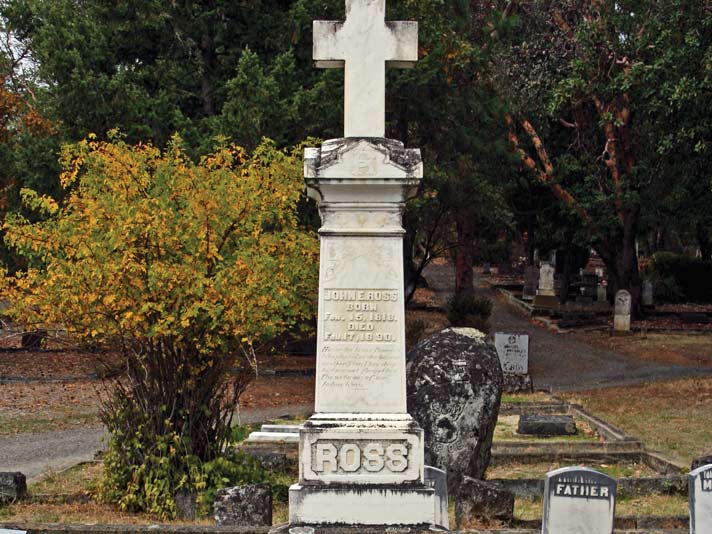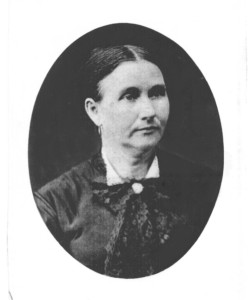Pioneer Profiles – October 2017
The previous two installments of Pioneer Profiles recounted Col. John England Ross’ exploits as Indian fighter, treasure seeker, and entrepreneur. We left him in the Klamath basin escorting wagon trains across the Cascades, providing protection from ambush and murder by the Modoc Indians. But by October of 1852, he and his men were no longer needed—winter was approaching, wagon trains had ceased coming, and it was time for Ross to return home to Jacksonville. There was also an additional incentive—a young lady named Elizabeth Hopwood.
In 1851, Elizabeth had traveled with her family from Hopwood, Pennsylvania, to the Willamette Valley. Her father, following other gold seekers, soon moved his family to Southern Oregon. They were living at Willow Springs in the cabin of Nat Dean in October of 1852 when Dean announced his upcoming marriage to Anna Huston. Ross and Elizabeth would be “standing up” for the couple on their wedding day.
Dean and Huston would be the first couple to marry in Jackson County—cause for special celebration! Apparently a typical bachelor party was held for Dean—with plenty of food and especially drink. A Ross family story about the evening told of a playful Ross pulling an iron kettle down on his head. But when the fun was over and he tried to remove the kettle, he couldn’t. Eventually a blacksmith was found who freed the head of a mortified and infuriated colonel.
Winter gave Ross time for a little courting of his own. In January 1853, John and Elizabeth were married—the second wedding in Jackson County and the first in Jacksonville. Naturally, all the town folk were invited. Elizabeth had a special wedding dress made for the ceremony, but Ross had nothing but his buckskins. The ladies of Jacksonville fretted over this lack of proper wedding attire.
Jane McCully offered Ross a white shirt that belonged to her husband. Dr. McCully’s smaller stature meant the fit was strained at best. When the nervous bridegroom joined a jumping contest with some of the men attending the ceremony, Ross’ exuberance split the shirt down the back. The ever-resourceful Jane quickly poked holes down each side of the split, laced it together with string, and the wedding proceeded as planned.
With no church and no place large enough to accommodate everyone, Ross and Elizabeth were married on the corner of Main and Oregon next to the town pump, even though it was early January. The Methodist preacher, Reverend Gilbert, presided. The groom was 35; the bride, 18.
The occasion was obvious cause for a jubilee. A progressive supper went house to house, ending with a spectacular wedding cake improvised from duck eggs, brown sugar, and bear suet. A grand ball, probably at one of the local saloons, capped the evening.
After his marriage, Ross settled down to being a farmer. He filed a donation land claim a few miles north of Jacksonville, and in October, after the birth of their first child, he began building a cabin at the corner of Ross Lane and Hanley Road. The new family moved into it in December. But this bucolic existence was short-lived.
What had at best been an uneasy peace between the settlers and the Rogue Indians fell apart. After a small band of Indians murdered a group of miners, a mob lynched a 9-year-old Indian boy who had the misfortune of being in town. Both sides became convinced that complete elimination of the other was the only solution.
Ross was called back to military duty. Over 200 men enrolled in the volunteer fighting force. General Joseph Lane led one battalion; Ross another. The troops proceeded to the wooded headwaters of Evans Creek where the Indians were primed and ready. After several hours of heavy gunfire and violent fighting, the Indian chiefs discovered that Lane, whom they respected, was the leader of their enemy. They requested a ceasefire and parley.
The Indians, sick of war, were ready for a truce. A peace talk was scheduled for September 10, 1853, below Table Rock. The Indians demanded that Ross be the interpreter because they knew he was fair. They trusted him. Out-numbered and out-armed, the Indians accepted confinement on a reservation along the Table Rocks.
Although the settlers rejoiced in the truce, it existed primarily on paper. Advocates of the “Extermination Policy” continued unprovoked attacks, burning Indian villages and murdering women and children. The oppressed Indians struck back, murdering indiscriminately in return.
Ross was at home working his farm and awaiting the birth of the couple’s second child when he was recalled to duty in 1855. This time he was commander of a 20 company volunteer army reinforced by regular Army troops.
The Indians, using guerilla tactics, were initially victors of the daily skirmishes. When their Hungry Hill hideout was discovered, frustrated soldiers didn’t wait for orders. They charged the steep hillside right into the Indians’ rifle fire, resulting in the soldiers’ confused retreat and several days of defensive fighting. Despite Ross reorganizing the troops and instilling a stronger sense of discipline, a similar scenario occurred a month later.
However, winter reversed the advantage. Lacking food and shelter, the Rogue Indians broke into small groups, becoming easy prey. The survivors who made their way back to the Table Rock preserve were hungry, ill and cold. In abject defeat, they were forced to the Siletz reservation—extermination was accomplished.
At last Ross was able to assume the role of solid citizen. He was chosen to represent Jackson County in the Territorial Council in 1855-56, served as a member of the State House in 1860, and was elected a member of the State Senate in 1866. When the Oregon & California Railroad Company was formed, Ross was elected a director. Elizabeth meanwhile occupied herself with the couple’s 10 children.
Ross was called to his final military action in 1872. When settlers realized the value of Modoc Indian land, the Modocs were subjected to the same treatment as the Rogue Indians. The Modocs chose to make a final bloody rebellion. Ross was named a Brigadier General of the Oregon militia, serving briskly and efficiently, but younger officers treated him more as a figurehead. At the end of the war, when told to select the guilty Indians and take them to Jacksonville for trial, he refused. There had been enough killing.
Ross served one more term as state senator during which he chaired the military committee. In 1882, he retired to his farm on Ross Lane, having served the Oregon Territory and State for almost 50 years. Ross died eight years later, his mind clouded by dementia.

